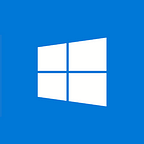Bringing peace to game play
Luna’s unconventional narrative leads to a Windows Developer Award.
Taking revenge on the “bad guy” is a standard plot in games. But developer Martin Middleton points out, that’s not how real life works. “You don’t take revenge on people; you make peace and move forward,” he says.
Martin is co-founder of Funomena is a small, independent game studio. It’s expressive and artistic work is guided by a heartfelt belief that games can have a positive impact on the world.
Luna, the studio’s first foray into mixed reality (MR), recently earned Funomena a 2018 Windows Developer Awards. The origami-inspired fable immerses players in an enchanting, celestial environment.
Unconventional, valuable ways to play
Rather than think in terms of conventional narratives, Funomena crafts community-based player experiences — both 2D and 3D — that are emotionally-resonant and encourage players to delve into their own imaginations.
“All our games start with a feeling or an experience that we think is valuable and that we’d like to share with others,” he explains.
Luna is based in a series of miniature worlds and tells the story of a bird that is tricked into eating a piece of the moon. Realizing the error of its ways, the bird attempts to reunite the fragmented pieces of the moon with the help of mystical animal spirits.
“Conceptually, Luna is about how you go forward when you’ve made a mistake that sets you back,” says Martin. “That sounds kind of heavy, so we wanted to make Luna an accessible game by telling it as a folk tale with animals. The aim was to share an experience that everyone can enjoy, no matter what age they are.”
From bananas to bird
Martin started programming at a young age, experimenting with QBasic by modifying Gorillas, a classic 2D video game that’s light on spirituality, but heavy on exploding bananas.
“Growing up, I was fortunate enough to have a computer in the house. But my parents didn’t buy game consoles for me, which inspired me to learn how to create my own games.”
After graduating, his passion blossomed into a full-time career as a developer with thatgamecompany, the studio behind Journey. Then, in 2013, he co-founded Funomena and now works across a variety of platforms including MR and gesture-input devices.
“I was the lead engineer on Luna. The engineering team was pretty small, so I was a direct contributor. That included everything from VR integration and animation, to tool pipelines and controls.”
Despite the magnitude of the challenge, Martin says that not all indie studios run on late nights and strong coffee.
“We try to prevent the really intense ‘crunch culture’ that has become somewhat of a stereotype in this industry. We feel like it’s not really sustainable and not the best way to make games. Sure, there were definitely a few late nights, but we managed to keep it pretty sane.”
The secret to a healthy and sustainable workflow, he says, begins with, “a really long” prototyping phase.
“Most of the work that goes into a game is communicating to the rest of the team what we think the game might be, or answering some sort of question. We often end up making the game over and over again, so you can’t get too attached to what you create day to day. You have to think of it more as a conversation.”
Expanding the accessibility of games
All the development work for Luna was done on Windows. In addition, the team leveraged Microsoft’s community of MR developers, creatives, and storytellers to gather valuable insights through Windows Insider and the Feedback Hub.
“What’s really interesting about the Windows MR platform is that Microsoft has put a lot of effort into getting it to run on any hardware spec. It’s much more accessible because there’s no need to go out and buy a prohibitively expensive machine. That allowed us to release Luna on a much broader spectrum of hardware.”
In the future, as more developers embrace the experiential quality of MR, Martin hopes to see more studios focus on socially-progressive games that are accessible to any age or gender.
“We want to see more people playing games, so our goals are to connect with that wider community and create more magical experiences for them.”
